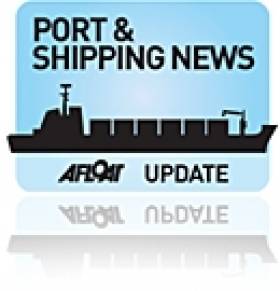Displaying items by tag: Nedlloyd Adriana
More Bananas Head for Cork
#PORTS & SHIPPING – As previously reported on Afloat.ie Maersk Line's newly launched liner service that includes the return of the banana trade to the Port of Cork continues as another shipment is due from Central America /Caribbean ports with the arrival of Nedlloyd Adriana (photo) tomorrow, writes Jehan Ashmore.
Nedlloyd Adriana (2003/ 26,833grt) is a younger sister of Maersk Nolanville (2004/26,833grt) which previously docked at the Ringaskiddy Deepwater Berth as part of the services weekly call. Onboard the 2,500 (TEU) twenty equivalent unit capacity containerships, they include 800 (reefer points) i.e electrically plugged in refrigerated containers to store perishable products.
Noting the cargo deck arrangement is divided by the superstructure, which in vessel design terms is not unusual, but is not normally seen in Irish waters due to this larger sized containership. She is fitted with three deck-mounted cranes positioned forward of the bridge and a single-aft crane to cater for the smaller cargo-deck astern.
The vessel was built in South Korea by Hyundai Heavy Industries in Ulsan and was launched as Adriana Star. She was later renamed P&O Nedlloyd Adriana until dropping her operators prefix in 2004.
When the vessel has completed operations in Ringaskiddy, she heads to UK and continental ports to complete the liner service which is served in total by a pool of eight similar sized vessels.
The term 'liner' service refers to a dedicated regularly operated network of long-distance routes across oceans that connect ports between the continents.
The liner service is complemented by an onward internal network of short-seas routes known as 'feeder' services and use smaller containerships such as Vega Stockholm (photo) which calls to Dublin Port (see BBC The 'Box') as previously reported on Afloat.ie
As in the case of the Maersk Line liner service which brings bananas from source directly to Cork, there is no requirement to transfer such cargo by feeder vessel from another port in the UK or mainland Europe.





























































